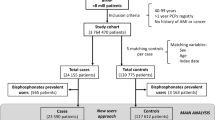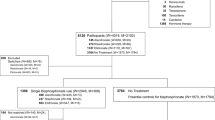Abstract
Summary
This population-based matched cohort analysis explored the effects of bisphosphonate treatment on acute myocardial infarction (AMI). We found that patients who received bisphosphonate therapy had a lower risk of AMI during a 2-year follow-up period (hazard ratio (HR) = 0.35). Our data support that bisphosphonates may provide protective effects against cardiovascular events.
Introduction
Although bisphosphonates have been suggested to have anti-atherosclerotic effects in animal models, evidence in human subjects is still conflicting. Therefore, this study aimed to explore the effects of bisphosphonate treatment on AMI using a population-based cohort study.
Methods
We identified 1,548 patients who received bisphosphonate therapy for osteoporotic fractures and randomly extracted 4,644 subjects with vertebral or hip fractures as a comparison cohort. Each patient was individually tracked for 2 years to identify those who subsequently suffered an AMI. Stratified Cox proportional hazards regressions were performed to assess the effect of bisphosphonate treatment on the risk of AMI.
Results
Six (0.4 %) of the patients who received bisphosphonate therapy and 49 (1.1 %) of the comparison subjects suffered an AMI during the 2-year follow-up period. The incidence rate of AMI was 1.94 (95 % CI = 0.79–4.03) per 1,000 person-years in patients who received bisphosphonate therapy and 5.28 (95 % CI = 3.95–6.92) per 1,000 person-years in comparison patients. Regression analysis revealed that patients who received bisphosphonate therapy had a lower hazard of AMI during the 2-year follow-up period than comparison patients (HR = 0.37, 95 % CI = 0.16–0.85, p = 0.020). After censoring cases that died from non-AMI causes and adjusting for both demographic and risk factors, the HR of AMI for patients who received bisphosphonate therapy was 0.35 (95 % CI = 0.14–0.84, p = 0.020) than that of comparison patients.
Conclusions
Patients who received bisphosphonate therapy had a lower risk of AMI during the 2-year follow-up period. Our data support that bisphosphonates may provide protective effects against cardiovascular events.

Similar content being viewed by others
References
Reid IR, Brown JP, Burckhardt P et al (2002) Intravenous zoledronic acid in postmenopausal women with low bone mineral density. N Engl J Med 346:653–661
Rodan GA, Reszka AA (2002) Bisphosphonate mechanism of action. Curr Mol Med 2:571–577
Black DM, Cummings SR, Karpf DB et al (1996) Randomised trial of effect of alendronate on risk of fracture in women with existing vertebral fractures. Fracture Intervention Trial Research Group. Lancet 348:1535–1541
Cummings SR, Karpf DB, Harris F et al (2002) Improvement in spine bone density and reduction in risk of vertebral fractures during treatment with antiresorptive drugs. Am J Med 112:281–289
Woolf AD, Akesson K (2003) Preventing fractures in elderly people. BMJ 327:89–95
Lyles K, Colón-Emeric C, Magaziner J, for the HORIZON Recurrent Fracture Trial et al (2007) Zoledronic acid and clinical fracture and mortality after hip fracture. N Engl J Med 357:1799–1809
Beaupre LA, Morrish DW, Hanley DA et al (2011) Oral bisphosphonates are associated with reduced mortality after hip fracture. Osteoporos Int 22:983–991
Sambrook PN, Cameron ID, Chen JS et al (2011) Oral bisphosphonates are associated with reduced mortality in frail older people: a prospective five-year study. Osteoporos Int 22:2551–2556
Center JR, Bliuc D, Nguyen ND, Nguyen TV, Eisman JA (2011) Osteoporosis medication and reduced mortality risk in elderly women and men. J Clin Endocrinol Metab 96:1006–1014
Martin CK, Werbeck JL, Thudi NK et al (2010) Zoledronic acid reduces bone loss and tumor growth in an orthotopic xenograft model of osteolytic oral squamous cell carcinoma. Cancer Res 70:8607–8616
Colon-Emeric CS, Mesenbrink P, Lyles KW et al (2010) Potential mediators of the mortality reduction with zoledronic acid after hip fracture. J Bone Miner Res 25:91–97
Anagnostis P, Karagiannis A, Kakafika AI, Tziomalos K, Athyros VG, Mikhailidis DP (2009) Atherosclerosis and osteoporosis: age-dependent degenerative processes or related entities? Osteoporos Int 20:197–207
Baldini V, Mastropasqua M, Francucci CM, D'Erasmo E (2005) Cardiovascular disease and osteoporosis. J Endocrinol Investig 28:69–72
den Uyl D, Nurmohamed MT, van Tuyl LH, Raterman HG, Lems WF (2011) (Sub)clinical cardiovascular disease is associated with increased bone loss and fracture risk; a systematic review of the association between cardiovascular disease and osteoporosis. Arthritis Res Ther 13:R5
Doherty TM, Fitzpatrick LA, Inoue D et al (2004) Molecular, endocrine, and genetic mechanisms of arterial calcification. Endocr Rev 25:629–672
Mussolino ME, Gillum RF, Madans JH (2001) Bone mineral density and stroke risk. Stroke 32:2956–2957
Mussolino ME, Madans JH, Gillum RF (2003) Bone mineral density and mortality in women and men: the NHANES I epidemiologic follow-up study. Ann Epidemiol 13:692–697
Tanko LB, Bagger YZ, Christiansen C (2003) Low bone mineral density in the hip as a marker of advanced atherosclerosis in elderly women. Calcif Tissue Int 73:15–20
Hyder JA, Allison MA, Barrett-Connor E et al (2010) Bone mineral density and atherosclerosis: the Multi-Ethnic Study of Atherosclerosis, Abdominal Aortic Calcium Study. Atherosclerosis 209:283–289
Jorgensen L, Joakimsen O, Rosvold Berntsen GK, Heuch I, Jacobsen BK (2004) Low bone mineral density is related to echogenic carotid artery plaques: a population-based study. Am J Epidemiol 160:549–556
Schulz E, Arfai K, Liu X, Sayre J, Gilsanz V (2004) Aortic calcification and the risk of osteoporosis and fractures. J Clin Endocrinol Metab 89:4246–4253
Kiel DP, Kauppila LI, Cupples LA, Hannan MT, O’Donnell CJ, Wilson PW (2001) Bone loss and the progression of abdominal aortic calcification over a 25 year period: the Framingham Heart Study. Calcif Tissue Int 68:271–276
Hyder JA, Allison MA, Wong N et al (2009) Association of coronary artery and aortic calcium with lumbar bone density: the MESA Abdominal Aortic Calcium Study. Am J Epidemiol 169:186–194
Jensky NE, Hyder JA, Allison MA et al (2011) The association of bone density and calcified atherosclerosis is stronger in women without dyslipidemia: the multi-ethnic study of atherosclerosis. J Bone Miner Res 26:2702–2709
Rennenberg RJ, Kessels AG, Schurgers LJ, van Engelshoven JM, de Leeuw PW, Kroon AA (2009) Vascular calcifications as a marker of increased cardiovascular risk: a meta-analysis. Vasc Health Risk Manag 5:185–197
Fiore CE, Pennisi P, Pulvirenti I, Francucci CM (2009) Bisphosphonates and atherosclerosis. J Endocrinol Investig 32:38–43
Strandberg TE (2008) Alendronate, osteoporosis, and atherosclerosis. Arch Intern Med 168:2386–2387, author reply 7
Watts N (2002) Bisphosphonates, statins, osteoporosis, and atherosclerosis. South Med J 95:578–582
Kang JH, Keller JJ, Lin HC (2012) A population-based 2-year follow-up study on the relationship between bisphosphonates and the risk of stroke. Osteoporos Int 23(10):2551–2557
Coats AJS, Shewan LG (2011) Statement on authorship and publishing ethics in the International Journal of Cardiology. Int J Cardiol 153:239–240
Chung KH, Lee HC, Kao S, Lin HC (2008) Urbanicity and methods of suicide: a nationwide population-based study. J Urban Health 85:136–145
Sorensen HT, Christensen S, Mehnert F et al (2008) Use of bisphosphonates among women and risk of atrial fibrillation and flutter: population based case–control study. BMJ 336:813–816
Bunch TJ, Anderson JL, May HT et al (2009) Relation of bisphosphonate therapies and risk of developing atrial fibrillation. Am J Cardiol 103:824–828
Fisher A, Southcott E, Srikusalanukul W et al (2007) Relationships between myocardial injury, all-cause mortality, vitamin D, PTH and biochemical bone turnover markers in older patients with hip fractures. Ann Clin Lab Sci 37:222–232
Steinbuch M, D’Agostino RB, Mandel JS et al (2002) Assessment of mortality in patients enrolled in a risedronate clinical trial program: a retrospective cohort study. Regul Toxicol Pharmacol 35:320–326
Black D, Delmas P, Eastell R, for the HORIZON Pivotal Fracture Trial et al (2007) Once-yearly zoledronic acid for treatment of postmenopausal osteoporosis. N Engl J Med 356:1809–1822
Dobrucali A, Tobey NA, Awayda MS et al (2002) Physiological and morphological effects of alendronate on rabbit esophageal epithelium. Am J Physiol Gastrointest Liver Physiol 283:G576–G586
Shao W, Orlando RC, Awayda MS, Shao W, Orlando RC, Awayda MS (2005) Bisphosphonates stimulate an endogenous nonselective cation channel in Xenopus oocytes: potential mechanism of action. Am J Physiol Cell Physiol 289:C248–C256
Farhat G, Strotmeyer E, Newman A et al (2006) Volumetric and areal bone mineral density measures are associated with cardiovascular disease in older men and women: the health, aging, and body composition study. Calcif Tissue Int 79:102–111
Tuominen O, Ylitalo-Heikkala R, Vehmas T, Mucha I, Ylitalo P, Riutta A (2006) Effects of bisphosphonates on prostaglandin E2 and thromboxane B2 production in human whole blood and monocytes stimulated by lipopolysaccharide and A23187. Methods Find Exp Clin Pharmacol 28:361–367
Delibasi T, Emral R, Erdogan MF, Kamel N (2007) Effects of alendronate sodium therapy on carotid intima media thickness in postmenopausal women with osteoporosis. Adv Ther 24:319–325
Celiloglu M, Aydin Y, Balci P, Kolamaz T (2009) The effect of alendronate sodium on carotid artery intima-media thickness and lipid profile in women with postmenopausal osteoporosis. Menopause 16:689–693
Nitta K, Akiba T, Suzuki K et al (2004) Effects of cyclic intermittent etidronate therapy on coronary artery calcification in patients receiving long-term hemodialysis. Am J Kidney Dis 44:680–688
Ariyoshi T, Eishi K, Sakamoto I, Matsukuma S, Odate T (2006) Effect of etidronic acid on arterial calcification in dialysis patients. Clin Drug Investig 26:215–222
Vestergaard P (2012) Acute myocardial infarction and atherosclerosis of the coronary arteries in patients treated with drugs against osteoporosis: calcium in the vessels and not the bones? Calcif Tissue Int 90:22–29
Acknowledgments
This study is based in part on data from the National Health Insurance Research Database provided by the Bureau of National Health Insurance, Department of Health, Taiwan and managed by the National Health Research Institutes. The interpretations and conclusions contained herein do not represent those of the Bureau of National Health Insurance, Department of Health, or the National Health Research Institutes.
Conflicts of interest
None.
Author information
Authors and Affiliations
Corresponding author
Additional information
Jiunn-Horng Kang and Joseph J. Keller have equal contribution to this manuscript.
Rights and permissions
About this article
Cite this article
Kang, JH., Keller, J.J. & Lin, HC. Bisphosphonates reduced the risk of acute myocardial infarction: a 2-year follow-up study. Osteoporos Int 24, 271–277 (2013). https://doi.org/10.1007/s00198-012-2213-5
Received:
Accepted:
Published:
Issue Date:
DOI: https://doi.org/10.1007/s00198-012-2213-5




